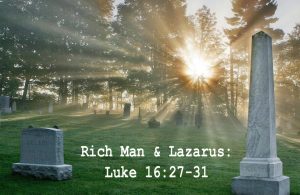 In this post, we’ll discuss the third and final segment of Jesus’ account of the rich man and Lazarus, Luke 16:27-31.
In this post, we’ll discuss the third and final segment of Jesus’ account of the rich man and Lazarus, Luke 16:27-31.
Abraham has just refused to let Lazarus give the rich man water. The rich man responds:
27 “And he said, ‘Then I beg you, father, to send him to my father’s house, 28 for I have five brothers, so that he may warn them, lest they also come into this place of torment.’ 29 But Abraham said, `They have Moses and the prophets; let them hear them.’ 30 And he said, `No, father Abraham; but if someone goes to them from the dead, they will repent.’ 31 He said to him, `If they do not hear Moses and the prophets, neither will they be convinced if someone should rise from the dead.'”
Ask the Witness, “In this passage, where did the rich man ask Abraham to send Lazarus?” According to the Watchtower interpretation of this passage, they should answer, “To the rich man’s father’s house.”
Ask, “What did the rich man want Lazarus to do there?”
According to verse 28, he wanted Lazarus to go to the rich man’s five brothers “in order that he may give them a thorough witness so that they will not also come into this place of torment.” (Watchtower’s 2013 New World Translation).
Say something like this: “I’m confused by this. Aren’t the brothers already in the same place of torment as the rich man? Haven’t they experienced the same reversal of circumstances? Haven’t they also been hearing Jesus’ tormenting message?”
Follow up by asking, “If the rich man doesn’t want his brothers tormented by Jesus’ fiery judgment message, why does he ask Abraham to send Lazarus to them? Wouldn’t he rather ask Abraham to keep Lazarus away from them?”
Also ask, “Isn’t asking that Lazarus give the brothers a thorough witness the opposite of asking Abraham to have Jesus’ disciples back off or water down the message? How would Lazarus’ giving the brothers a thorough witness help them avoid torment? According to the Watchtower interpretation, wasn’t it a thorough Christian witness that was causing the torment?”
Follow up by asking, “Why does Abraham refuse to send Lazarus to give the brothers a thorough witness? Aren’t witnesses of Jehovah supposed to try to give everyone a thorough witness?”
In verse 30, the rich man talks tells Abraham, “…if someone goes to them from the dead, they will repent.”
Ask, “What does the rich man mean when he says, “If someone from the dead goes to them”? If ‘death’ in this story is only symbolic of a change in circumstances in this life, why doesn’t the rich man just ‘go from the dead’ to his brothers himself? Why does he ask Abraham to send Lazarus to them?”
Follow up by asking, “Why does he claim that if Abraham will send Lazarus to them they will repent? Does this mean that he wants his brothers to repent?” (Witnesses deny this.)
Ask further, “If the rich man knows that repentance is the way to end the torment, what prevents him from repenting himself and ending his own torment? Why doesn’t Abraham even suggest that he do so?”
In verse 31, Abraham concludes by saying, “If they do not hear Moses and the prophets, neither will they be convinced if someone should rise from the dead.'”
Ask the following questions, giving the Witnesses time to response after each one:
- If, in Jesus’ story, “death” is only symbolic of a change of circumstances in this life, what does “rising from the dead” symbolize?
- Was the rich man asking Abraham for a special sign or miracle in which someone would literally rise from the dead and go to his brothers?
- Since the only person they were discussing sending to the brothers was Lazarus, wouldn’t that mean that Lazarus was literally dead?
- If the rich man was also literally dead, wouldn’t that explain why he couldn’t go to his brothers himself and warn them to repent in order to avoid torment and anguish?
- Why would “death” be figurative throughout the story but literal at the very end?
- Is it just a coincidence that Jesus had a close friend named Lazarus who later died and was raised from the dead?
Your turn:
Do you agree that the third segment of Jesus’ story completely refutes the Watchtower’s claim that the rich man and Lazarus never really died and that “death” is only symbolic of a reversal of God’s favor in this life
Share your thoughts in the comments.

Leave a Reply
Be the First to Comment!